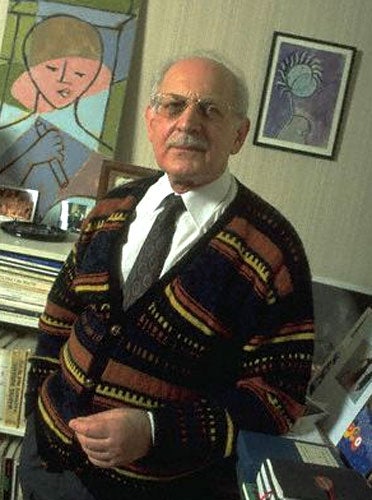Sarane Alexandrian: French art historian, poet and right-hand man to André Breton

Sarane Alexandrian was a French art historian and poet, author of more than 50 books, the majority of which focused on the Surrealist movement. He was widely recognised as the right-hand man at the side of André Breton, the father of surrealism, for a brief period during the late 1940s.
Alexandrian was born in Baghdad, Iraq in 1927. His father, Vartan Alexandrian, was of Armenian origin and served as stomatologist to King Faisal I, the pan-Arabist leader. At the age of six, and following a period of illness, he was sent to Paris to stay with his maternal grandmother, Sandrine Colin.
At the outbreak of war, in September 1939, Colin moved to Peyrat-le-Château, near Limoges, together with her grandson. Alexandrian's initiation to Dada and surrealism came in the summer of 1943 when, aged 16, he met Raoul Hausmann, one of the key figures in the Berlin Dada group, who was staying in the same village as a refugee. On meeting Hausmann and hearing about his colleagues, he recalled that:
"I was completely astounded. So, here were writers who did not look for the approval of the crowd but instead acted as intrepid agitators, fighting against prejudice, defying the usual audience and throwing their books like rather dangerous paper bombs to create panic in conventional society."
Like many young men of his age during wartime, Alexandrian worked together with members of the Resistance to collect supplies parachuted into the region by the Allies. This same period saw the first publications of his poems: a sonnet, "Esprit pur", appeared on the letters page of the local weekly newspaper when he was just 14. Shortly afterwards, a patriotic piece titled "Cri du coeur d'un jeune Oriental" was printed in the magazine Unir, edited by Robert Giraud. Giraud went on to publish several more pieces by Alexandrian in his 1945 group anthology Couronne de vent, as well as articles by him on Paul Eluard and Hausmann in Unir.
Inspired by the earlier meeting with Hausmann, Alexandrian wrote to Breton in March 1947. Breton replied just two days later and suggested meeting at the Sorbonne for a conference on surrealism and politics, organised by Tristan Tzara, the one-time Dadaist. It turned out to be a stormy event, during which Breton criticised Tzara for supporting Stalinism. Alexandrian defended Breton's position versus Tzara, which led to an immediate mutual admiration, to such an extent that he soon took up the role of secretary general of the Surrealist movement.
A disagreement within the movement, during October 1948, saw the departure of Victor Brauner and Roberto Matta, and resulted subsequently in Alexandrian himself leaving the formal group. He, Brauner and Matta set up a counter group, Contre-groupe H – named after Rimbaud's poem of the same name – and contributed to the short-lived magazine N.E.O.N.
Surrealism, however, was to remain important for the rest of his life. Away from the constraints of Breton's group, Alexandrian was able to concentrate on writing about the personalities and ideas of that world which meant so much to him, without having to be involved in the day-to-day politics of the movement. So, for example, his monographs on Dali (1969), André Breton par lui-même (André Breton in his Own Words, 1971), Max Ernst (1971), Hans Bellmer (1972) and Victor Brauner (2004) were biographies of subjects whom he had still counted as his friends, even after his departure.
His most significant writing project was probably Les Terres Fortunées du Songe (The Rich Lands of the Dream, 1980), which included 18 drawings by Jacques Hérold. Whilst owing a debt to surrealism, it is an unclassifiable work, combining elements of myth, science fiction and fantasy to tell the story of a future utopian world.
The autobiographical book, L'Aventure en Soi (The Adventure within Oneself), was published in 1990. A reviewer of this work wrote enthusiastically: " ... it is also a book of love; the love of life; above all love of reading, of art, of poetry and of course the love of women."
In 1995 Alexandrian founded Supérieur Inconnu, a literary magazine based on the declared principles of "complete non-conformism" and still dedicated, for the most part, to surrealism. The periodical continued until 2001 and was revived under the same title by Alexandrian in 2005, as an irregular publication.
A comprehensive biography, Sarane Alexandrian ou le Grand Défi de L'imaginaire (Sarane Alexandrian or the Great Challenge of the Imaginary) by Christophe Dauphin, was published in 2006. Dauphin observes of Alexandrian's remarkable creativity:
"Alexandrian has always worked towards the awakening and liberation of man, taking inspiration from living poetry, dreams, magical thinking or sexual magic: that is to say the whole of life."
His last work, Les Peintures Surrealistes (Surrealist Painters), has recently been published in French and English.
Marcus Williamson
Sarane Alexandrian, art historian, writer, philosopher: born Baghdad, Iraq 15 June 1927; married 1959 Madeleine Novarina (died 1991); died Ivry-sur-Seine, France 11 September 2009.
Join our commenting forum
Join thought-provoking conversations, follow other Independent readers and see their replies
Comments
Bookmark popover
Removed from bookmarks